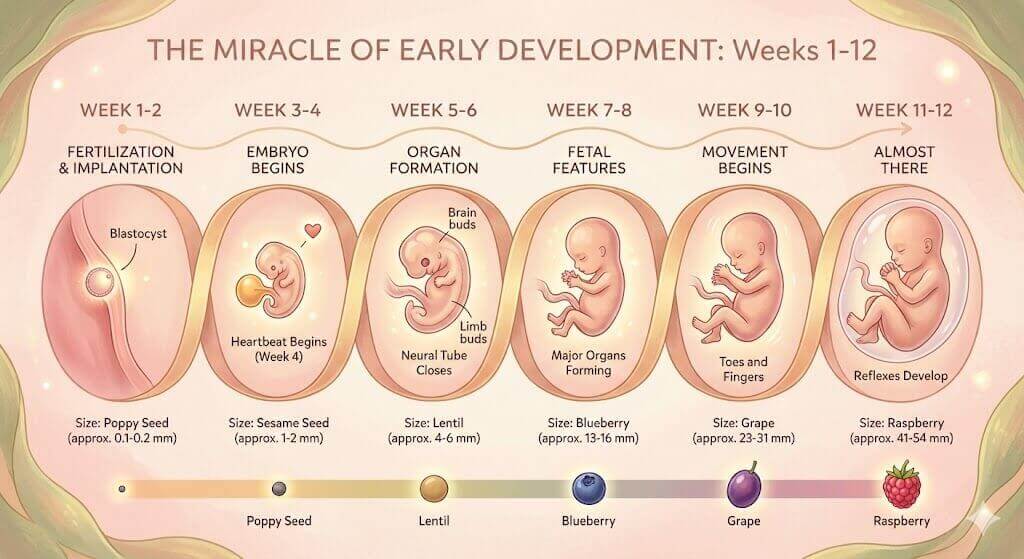Understanding Your IVF Pregnancy Journey
Embarking on an IVF pregnancy journey is both exciting and overwhelming. This comprehensive guide will help you understand what to expect during your early pregnancy weeks after embryo transfer, providing you with detailed insights into your baby's development and your changing body.
What Makes IVF Pregnancy Different?
Unlike natural conception, IVF pregnancies have a known conception date (embryo transfer date), which makes due date calculations more accurate. This precision allows for better monitoring and care throughout your pregnancy. The controlled environment of IVF also means that your healthcare team has detailed information about your embryo's development stage, allowing for more personalized care and monitoring.
Additionally, IVF pregnancies often require more frequent monitoring in the early stages, including blood tests to check hormone levels and early ultrasounds to confirm implantation and check for multiples. This increased monitoring can provide reassurance but may also feel overwhelming at times.
Early Development Milestones
During the first few weeks after embryo transfer, your baby undergoes rapid development. Understanding these milestones can help you feel more connected to your growing baby and provide peace of mind during this critical period. The first trimester is particularly important as it's when all major organs and systems begin to form.
Your embryo will progress through several key stages: implantation, cell division, organ formation, and the development of the neural tube that will become your baby's brain and spinal cord. Each stage is crucial for healthy development, and understanding what's happening can help you feel more connected to the process.
What to Expect Week by Week
Each week brings new developments and changes. From implantation to the formation of major organs, your baby's growth follows a precise timeline that we'll explore in detail. Here's what you can expect during your early pregnancy weeks:

Weeks 1-2: The Foundation
During these first weeks, your embryo is working hard to implant into the uterine lining. This process typically takes 6-12 days after embryo transfer and is crucial for a successful pregnancy. You may not notice any symptoms yet, or you might experience mild cramping or spotting - both are normal during this early stage.
Weeks 3-4: Confirmation and Growth
This is when you may be able to get a positive pregnancy test, and your baby's development is accelerating rapidly. Your embryo is now about the size of a poppy seed and is developing the neural tube, which will become your baby's brain and spinal cord.
Weeks 5-6: Major Milestones
Your baby's heart begins to beat around week 5, and you may be able to see it on an early ultrasound. Morning sickness often peaks during week 6, but your baby is growing stronger every day with a beating heart and developing organs.
Weeks 7-8: Rapid Development
Your baby's brain is developing rapidly, and facial features are beginning to take shape. You're approaching the end of the embryonic period, and your baby is now about the size of a raspberry.
Weeks 9-12: The Fetal Period
Your baby is now officially a fetus and beginning to make small movements. All major organs are in place and beginning to function. You're approaching the end of the first trimester, which is a major milestone.
Physical Changes and Symptoms
During early pregnancy, you may experience a variety of symptoms as your body adjusts to supporting your growing baby. Common early symptoms include:
- Fatigue: Your body is working hard to support your growing baby, which can leave you feeling more tired than usual.
- Breast tenderness: Hormonal changes can cause your breasts to feel sore or sensitive.
- Nausea and vomiting: Often called morning sickness, though it can occur at any time of day.
- Frequent urination: Your growing uterus puts pressure on your bladder.
- Mood swings: Hormonal changes can cause emotional ups and downs.
Important Considerations
While IVF pregnancies are generally healthy, they may require additional monitoring. Your healthcare provider will guide you through any special considerations based on your individual circumstances. It's important to:
- Continue taking any prescribed medications as directed
- Attend all scheduled appointments and tests
- Maintain a healthy lifestyle with proper nutrition and exercise
- Communicate openly with your healthcare team about any concerns
- Be aware of warning signs that require immediate medical attention
Emotional Support and Self-Care
The early weeks of pregnancy can be emotionally challenging, especially after the stress of IVF treatment. It's important to take care of your mental health as well as your physical health. Consider:
- Joining a support group for IVF patients
- Practicing relaxation techniques like meditation or yoga
- Maintaining open communication with your partner and family
- Seeking professional counseling if needed
- Celebrating small milestones and positive developments
Looking Ahead
As you progress through your early pregnancy weeks, remember that each day brings you closer to meeting your baby. While the journey may have its challenges, it's also filled with moments of joy and anticipation. Trust in your body's ability to nurture your growing baby, and don't hesitate to reach out for support when you need it.
Your healthcare team is there to guide you through every step of this journey, providing the medical care and emotional support you need to have a healthy pregnancy and a healthy baby.